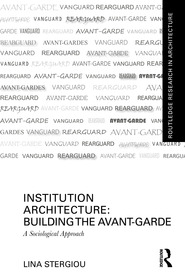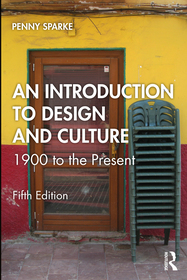
Institution Architecture: Building the Avant-Garde
A Sociological Approach
Series: Routledge Research in Architecture;
- Publisher's listprice GBP 145.00
-
69 273 Ft (65 975 Ft + 5% VAT)
The price is estimated because at the time of ordering we do not know what conversion rates will apply to HUF / product currency when the book arrives. In case HUF is weaker, the price increases slightly, in case HUF is stronger, the price goes lower slightly.
- Discount 10% (cc. 6 927 Ft off)
- Discounted price 62 346 Ft (59 378 Ft + 5% VAT)
Subcribe now and take benefit of a favourable price.
Subscribe
69 273 Ft

Availability
Not yet published.
Why don't you give exact delivery time?
Delivery time is estimated on our previous experiences. We give estimations only, because we order from outside Hungary, and the delivery time mainly depends on how quickly the publisher supplies the book. Faster or slower deliveries both happen, but we do our best to supply as quickly as possible.
Product details:
- Edition number 1
- Publisher Routledge
- Date of Publication 8 December 2025
- ISBN 9781032191270
- Binding Hardback
- No. of pages330 pages
- Size 234x156 mm
- Language English
- Illustrations 4 Illustrations, black & white; 4 Line drawings, black & white; 8 Tables, black & white 700
Categories
Short description:
Institution Architecture: Building the Avant-garde takes a terminological, sociological and semiological approach that develops by tracing the ‘avant-garde’ in a century span of literatures for a textual analysis, unpacking the text, and in a process analysis, interpreting it.
More
Long description:
Institution Architecture: Building the Avant-garde takes a terminological, sociological and semiological approach that develops by tracing the ‘avant-garde’ in a century span of literatures for a textual analysis, unpacking the text, and in a process analysis, interpreting it.
The sources consist of 825 well-known, globally influential European, including Russian, architectural literatures of the extended 1920s, and of Anglo-Saxon literatures of the extended 1960s to the 2010s. The book traces the denotations that the term ‘avant-garde’ acquires in them and shows the different notions under the ‘avant-garde’ signifier, directing attention to the term’s early twentieth-century roots and modes, its 1960s rising usage, modes and function, and its post-1960s to 2010s developments. It sheds light on the sociological topography of the avant-garde, and through the writings, on the ways in which the term and avant-gardism connect, the actors, agencies and mediators therein, on the terms’ techniques and modes, indicating the reasons for its heretofore limited systematic inquiry. This book aims at unravelling a century-old ‘avant-garde’ mystic function for unlocking horizontal, plural, and transparent conversations about intra- and inter-disciplinary futures including architecture. This close terminological interrogation could open up inter-terminological, horizontal, transnational, intersubjective discourses of values and liberatory dynamics in cross-disciplinary dialogues. The book will therefore be relevant to scholars and researchers interested in the avant-garde in architecture.
MoreTable of Contents:
Acknowledgements
Abbreviations
Introduction: ‘Avant-Garde’ Coloniality of Value
Chapter One: Institution Arts, 1960s and after: ‘Avant-Garde’ Origins Mediation, Agency
Chapter Two: Institution Architecture, 1920s: Avant-gardism - ‘Avant-Garde’ -Vanguard
Chapter Three: Institution Architecture, 1960s: ‘Avant-Garde’ Roots and Function
Chapter Four: 1960s-70s ‘Avant-Garde’ Architecture
Chapter Five: 1960s-80s Avant-gardism
Chapter Six: Strategy ‘Avant-Garde’ Avant-gardism. Two Cases 1960s-1980s
Chapter Seven: ‘Russian Avant-Garde’
Chapter Eight: Avant-Garde Semiotic Domain: Subcategories. Unprofessionalisation
Appendix
Primary and Main Sources
Bibliography and Reference List
Index













